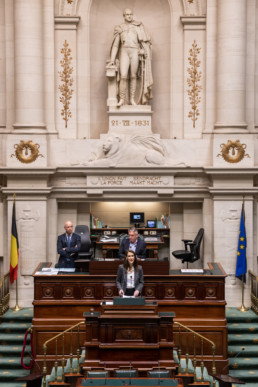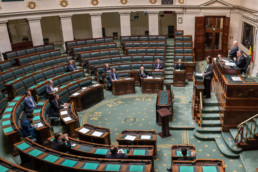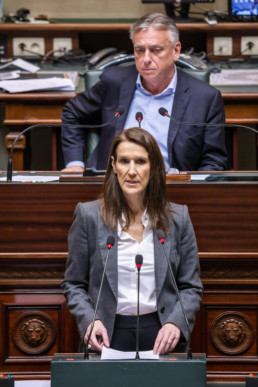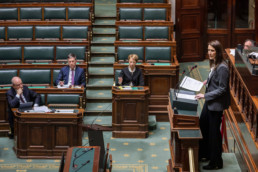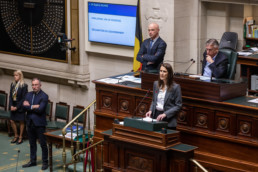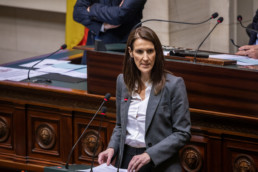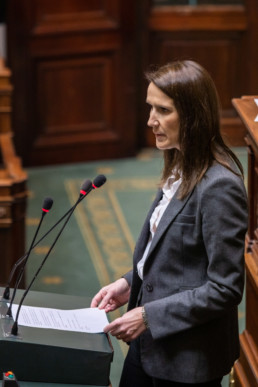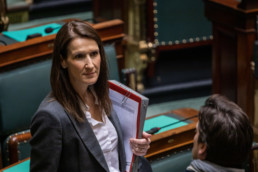Check against delivery.
Mr. President,
Dear colleagues,
This morning, the government was sworn in by the King.
It was a solemn and important moment, given the gravity of the situation we find ourselves in. The highly unusual way in which Parliament is now working bears testament to this unusual occasion.
That is why I am standing here before you today, with a clear head and determination.
I am fully committed to the task at hand.
Right now, the world, Europe and Belgium are venturing into unchartered territory.
Covid-19 is a major threat to our population’s health.
It requires unprecedented and exceptional measures to keep our people safe.
This requires us to work together, in national unity.
Hand in hand.
The relationship between Parliament and the Government must be strong, and based on mutual trust.
In light of the extreme urgency of the situation, it was clear to the vast majority of parties in this assembly that a government had to be formed as soon as possible.
We need this broad unity to tackle the current challenges.
Challenges that are well understood by the nursing staff, who are at the forefront of the care and services provided to patients.
They continue to work hard, day after day, dealing with circumstances that are unprecedented in modern history.
Their dedication is remarkable and their courage exemplary.
They are not the only ones.
In both the public and private sectors, many of our fellow citizens are working every day to ensure that Belgium can continue to function.
They do so out of a sense of duty, despite the worries that most of them also have.
We recognise this and are infinitely grateful to them.
All these people should be a source of daily inspiration to us; they should bestow a sense of individual and collective responsibility on us all.
They should make us aware of the absolute need to follow the rules and to not put ourselves at risk or infect others – thereby avoiding the risk of our hospitals being overwhelmed.
We are all affected by this pandemic. The virus makes no distinctions among us.
It is now up to us to show common sense, civility and solidarity.
The evolution of Covid-19 in our country is monitored – day after day, hour after hour – by our services, as it has been for several weeks now.
Our first priority remains mobilizing all possible staff allowing hospitals to focus exclusively on treating patients.
The government and all healthcare bodies have also sprung into action to address the issue of the availability of medical equipment and devices.
We are in constant communication with our scientific and medical experts, as well as the Crisis Centre, to understand the situation and make the right decisions at the right time.
In this respect, I would like to inform you that after this meeting, the Inner Cabinet (conseil des ministres restreint/kernkabinet) and I will meet with the federated entities, ministers and relevant departments within the National Security Council to assess the latest report from the Risk Management Group and, if necessary, take additional measures quickly to protect the health of all our fellow citizens.
Mr President,
Dear colleagues,
We know that the decisions will also have clear socio-economic consequences. That is why we have already taken a first set of measures and we will continue to work on them, to soften the impact as much as possible for all economic stakeholders.
To this end, a macro-economic monitoring group has been set up – the ERMG, which stands for “Economic Risk Management Group”.
This will allow us to better map the economic and social consequences of the pandemic, for businesses and employees.
Belgium has many assets and we will have to use them.
I am confident everyone will do so.
This caretaker government immediately took stock of the situation in Belgium regarding the pandemic. We have taken action.
But our actions in the fight against the virus cannot have the intended success if they are not widely supported.
Our first priority was to bring together the various levels of government. It is in this spirit that we quickly organised regular meetings of the Consultative Committee.
We have also made sure to include the minister-presidents in the National Security Council.
Consultation with the federated entities was important from the start of the crisis.
And here I would like to thank those responsible in the federated entities for the decisive role they have played in preparing the country for the crisis we are currently experiencing.
Today, we need a stable parliamentary majority to stand together in the fight against this virus.
My team and I recognise that the agreement reached last Sunday between a majority of the political parties in our country entails great responsibility.
This unity is based on an essential principle: to give the current government, through a vote of confidence, full powers to successfully manage this crisis.
Among other things, we are committed:
- To managing the public health situation during the coronavirus crisis;
- To maintaining public order;
- But also to alleviating the socio-economic problems of employees and the self-employed.
We propose a vote on the system of the provisional twelfths, with only one amendment, which is a cross-departmental provision of EUR 1 billion to be used exclusively for fighting the coronavirus.
We also need to prepare, step by step, for the economic development and recovery as soon as this crisis is over.
These objectives can also be achieved by using the powers for 6 months – with an evaluation after 3 months – with regard to:
- public health;
- social affairs, including labour law;
- security;
- and the economy.
All of these topics will be discussed and finetuned with the various representatives of the political parties before they are – of course – put to the Chamber of Representatives for a vote.
At any rate, the way in which these powers have been executed will have to be reviewed by the Chamber at the end of this period.
Because of the exceptional nature of this situation, I have also proposed for the Inner Cabinet to meet regularly and, whenever necessary, to include representatives from the parties concerned, to ensure transparency in carrying out the powers.
Trust between Parliament and this Government must be confirmed through a formal vote on a motion this Thursday.
This vote will allow the Government to execute its prerogatives, with full powers.
We will implement this trust faithfully, in light of the fight against the coronavirus and in the context I have just outlined.
Moreover, in no later than six months’ time, I will ask for Parliament’s vote of confidence again. As a result, we will not go beyond the framework of caretaker matters to address subjects unrelated to this crisis.
The goal should remain to form a federal government that has a parliamentary majority so as to pursue a comprehensive and positive programme for our country.
Mr. President,
Dear colleagues,
The time has come for unity.
The time has come to unite; a unity that goes beyond the ranks of this assembly.
The whole country must come together in the face of this ordeal.
National unity is not something you achieve by proclaiming it on a Sunday evening.
It is forged during the hard times we face, hour after hour and day after day.
All political factions must show their support for the agreement reached by systematically opting for dialogue, a constructive approach and an awareness of the scale of events.
You can rest assured of this Government’s ongoing attention for all ideas around reforms, measures and constructive proposals that can contribute to the national effort.
From now on, we have to prove together, every day, that we can transcend the sterile ideological quarrels in which we have become embroiled in recent months.
As I said at the beginning of this statement, I am aware of the context, but also more determined than ever.
With one simple objective: to protect the health of our people.
This is not a line from a political manifesto.
It is our most fundamental duty.
And we will fulfil this duty, I hope, with the confidence of this Parliament.
Thank you.
